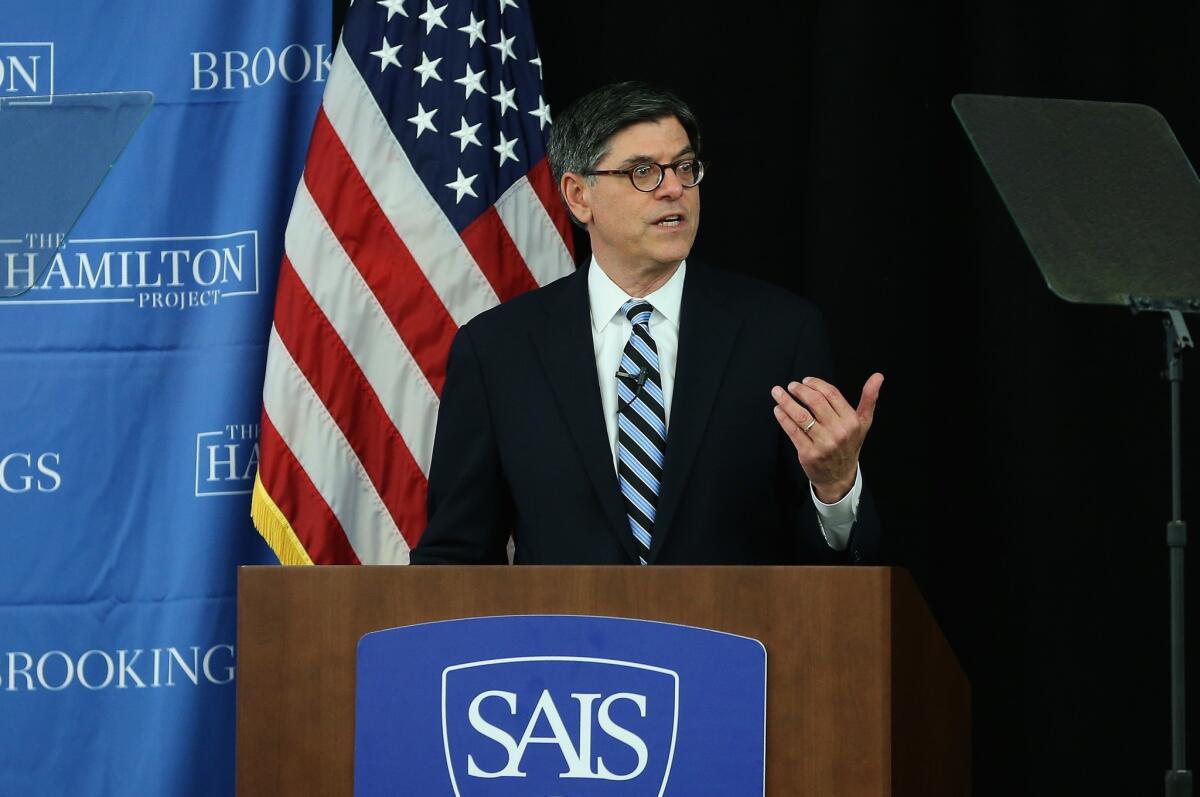Treasury takes steps to discourage offshore tax-shifting inversions

- Share via
Reporting from Washington — The Obama administration on Monday announced long-awaited executive actions to try to discourage companies from reincorporating abroad to reduce their U.S. taxes.
The steps -- technical revisions to the tax code -- will “meaningfully reduce the economic benefits” to firms that try so-called corporate tax inversions in the future, Treasury Secretary Jacob J. Lew said.
------------
FOR THE RECORD
Sept. 22, 5:08 p.m.: An earlier version of this post quoted Treasury Secretary Jacob J. Lew as saying the revisions to the tax code will “substantially reduce the economic benefits” to firms that try tax inversions. He actually said the changes will “meaningfully reduce the economic benefits” to firms that try tax inversions.
-----------
But he and President Obama continued to call on Congress to address the issue either through a broad overhaul of corporate taxes or targeted legislation, which would be more effective in curtailing a maneuver that has become more popular among corporations seeking to avoid the high U.S. tax rate.
“We’ve recently seen a few large corporations announce plans to exploit this loophole, undercutting businesses that act responsibly and leaving the middle class to pay the bill, and I’m glad that Secretary Lew is exploring additional actions to help reverse this trend,” Obama said.
Some multinational corporations including pharmaceutical firm AbbVie Inc. and Burger King Worldwide Inc. have agreed to buy smaller companies in foreign countries with much lower tax rates and move their headquarters there, sheltering billions of dollars from U.S. taxes.
The Obama administration has questioned the “economic patriotism” of those companies, saying the moves were not done for economic reasons but simply to avoid paying their fair share of U.S. taxes for scientific research, roads and other publicly-funded items.
“These first, targeted steps make substantial progress in constraining the creative techniques used to avoid U.S. taxes, both in terms of meaningfully reducing the economic benefits of inversions after the fact, and when possible, stopping them altogether,” Lew said.
“While comprehensive business tax reform that includes specific anti-inversion provisions is the best way to address the recent surge of inversions, we cannot wait to address this problem,” he said.
Democrats and some Republicans have criticized the tax-shifting moves by companies. But Republicans want to address the issue through a broad overhaul of the corporate tax code, an effort that has become stalled in Congress.
The Obama administration had threatened that it would take executive action if Congress did not act. And with lawmakers recessing last week until after the November elections, Lew announced the steps Monday.
The actions would apply only to companies that invert after Monday.
Treasury said it would make it would eliminate some techniques, such as so-called “hopscotch loans” that foreign-headquartered companies use “to gain tax-free access” to some earnings.
Treasury also will strengthen a requirement that the foreign company must be at least 20% foreign owned by making it more difficult for a U.S. firm to reduce its size before such a transaction by, for example, issuing large dividends to shareholders.
The Obama administration has asked Congress to take even tougher steps, such as requiring a company to have at least 50% foreign ownership for it to be considered a foreign firm for tax purposes.
The administration and some top Congressional Democrats want those restrictions to be retroactive to the spring, when lawmakers first started talking about addressing the issue and might have helped trigger some of the recent inversions.
Sen. Ron Wyden (D-Ore.), chairman of the tax-writing Senate Finance Committee, cheered the administration’s executive steps.
“As more companies use inversions as a strategy to avoid paying U.S. taxes, it is clear that Congress must act to protect remaining U.S. businesses, workers and families from having to pay higher taxes,” he said.
“Today’s action by the Treasury Department reinforces the urgency for action before this growing wave of inversions erodes our nation’s tax base,” he said. “But only Congress has the full range of tools to address both the immediate problem and ensure U.S. businesses continue to be competitive in the global economy.”
Sen. Orrin Hatch (R-Utah), the committee’s top Republican, has said inversions need to be addressed but opposed retroactive action and believes the issue should be dealt with as part of an overhaul that reduces the high U.S. corporate tax rate.
“America’s tax system is broken to the point that it’s putting our nation at a competitive disadvantage around the globe,” Hatch said. “In the end, any solution that permanently addresses inversions must be legislated by Congress.”
For breaking economic news, follow @JimPuzzanghera on Twitter
More to Read
Inside the business of entertainment
The Wide Shot brings you news, analysis and insights on everything from streaming wars to production — and what it all means for the future.
You may occasionally receive promotional content from the Los Angeles Times.











